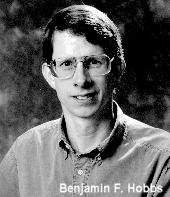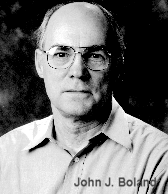
News Release
|
Office of News and Information Johns Hopkins University 3400 N. Charles Street Baltimore, Maryland 21218-2692 Phone: (410) 516-7160 / Fax (410) 516-5251 |
December 11, 1997 FOR IMMEDIATE RELEASE CONTACT: Phil Sneiderman prs@jhu.edu |
Deregulating Electric Utilities: A Boon for
Consumers or a Risky Shot in
the Dark?
Hopkins professors weigh pros and cons of move toward free
market
Electric customers almost everywhere in the United States will soon pick their power company, just as they now choose their long-distance phone service. Federal and state officials have begun lifting the regulations that have allowed most electric utilities to maintain monopoly control over their service areas.
As electric companies compete, will all customers enjoy lower rates or just the ones who can buy in bulk? Will customers in remote areas and those with poor credit be left out in the cold? Will these market changes lead to more pollution or less?
John J. Boland and Benjamin F. Hobbs, professors of geography and environmental engineering at The Johns Hopkins University, have been studying the economic and environmental impact of electric utility deregulation. Boland is a consultant to the World Bank and has served as an expert witness before state public utility commissions. He is concerned that electric customers and utility regulators may have unrealistic expectations about how well this new system will work. Hobbs is a Federal Energy Regulatory Commission consultant and conducts research on utility planning issues for the National Science Foundation. He is more optimistic, believing that consumers and the environment will benefit. Boland and Hobbs are available for interviews regarding electric utility deregulation. To arrange an interview with either researcher, please contact Phil Sneiderman.
The professors recently shared some opinions and predictions on this complex issue. First, they were asked to review the origin of this push toward deregulated electricity.
 Hobbs: Until recently, people
thought it was absurd
that somebody would build a power plant without having a
guaranteed monopoly market. But
things have changed drastically. In 1978, The Public Utility
Regulatory Policies Act forced
utilities to buy power from small firms that used renewable
energy, like wind or solar power,
and cogenerators. That opened the door a crack, and through that
crack came a lot more new
power plants than people expected.
Hobbs: Until recently, people
thought it was absurd
that somebody would build a power plant without having a
guaranteed monopoly market. But
things have changed drastically. In 1978, The Public Utility
Regulatory Policies Act forced
utilities to buy power from small firms that used renewable
energy, like wind or solar power,
and cogenerators. That opened the door a crack, and through that
crack came a lot more new
power plants than people expected.
In the 1980s, we had the deregulation of airlines, telecommunications and then natural gas, sometimes with mixed results and sometimes with dramatic decreases in costs. Then people started looking at the last regulated industry and asked, "Why not?"
In 1992, Congress directed the Federal Energy Regulatory Commission to open up the wholesale market for electricity, but not the retail market. The push for retail competition is coming at the state level. Industrial customers have been paying high rates for electricity. They see a political opportunity here to get out from under those excessive costs. They're really pushing hard--and they're winning.
 Boland: They see an
opportunity to use the size of
their firm to cut a national deal, where one supplier will agree
to provide energy to, say, all
Ford Motor Co. facilities. Wal-Mart already has their national
supplier lined up. And you can
be sure it was at a very favorable price. But there are a lot of
customers out there with zero
market power, who can't cut a deal with anybody. How the
hierarchy of prices is going to
work out is an interesting matter of speculation.
Boland: They see an
opportunity to use the size of
their firm to cut a national deal, where one supplier will agree
to provide energy to, say, all
Ford Motor Co. facilities. Wal-Mart already has their national
supplier lined up. And you can
be sure it was at a very favorable price. But there are a lot of
customers out there with zero
market power, who can't cut a deal with anybody. How the
hierarchy of prices is going to
work out is an interesting matter of speculation.
So will the deregulation of electricity be good for consumers?
Boland: It depends on which consumers. It will be better for industrial and commercial customers and for some large residential customers who have the ability to shop for a better deal and to buy bulk energy from a low-cost provider. It will be worse for the customers left behind, those who are not attractive to these companies.
You can expect energy suppliers other than the traditional utilities to "cherry-pick," to sell to the customers they can supply the easiest and at the lowest cost. You can expect them to ignore customers who don't look like a good deal--customers in remote areas, those with bad credit. They'll have no obligation to serve them, so they won't. Rates for these "problematic" customers will go up.
Hobbs: We'd like to think the rate differences will just reflect the cost of service, but that might be naive.
Most energy companies will still have to sign up plenty of residential customers to generate profits, and the professors expect a big marketing push.
Boland: Yes, complete with telephone calls during dinner from people trying to sign you up as an electric customer. And there will be quite a gradient of prices. Wal-Mart may be able to buy power for 2 cents per kilowatt hour; an office building may pay 3 cents, a large residential customer, 5 cents, and some poor suckers left behind will be buying it for 8 cents.
Hobbs: During pilot deregulation programs in New England, we've seen things like utilities offering free Ben and Jerry's ice cream to new customers. One interesting trend is "green power," where a utility will emphasize that it sells power from "clean" sources. Some people are willing to pay a premium for power that causes less pollution, just as some people will pay a premium for paper towels made from recycled paper.
The professors say deregulation may lead to less pollution--with the proper incentives.
Boland: There are three ways you can get environmental compliance. One is "command and control." You set a regulation. If you catch somebody violating it, you punish them. Another way is economic incentives. You construct systems where the company has a reason to do things a certain way through some kind of a tax or transferrable permits. A third way, which is often neglected when people talk about this, is voluntary compliance. There's a lot more voluntary compliance in environmental control than is usually recognized.
Certainly, when you move toward deregulation, voluntary compliance is going to work less well. But you can expect economic incentives to work better. So that's the trade-off.
Hobbs: If we create systems that provide economic incentives for cleaning up, you may get even more environmental clean-up. The sulfur dioxide allowance system works well. Each year, a utility get permits to emit so many tons per year. If they reduce their pollution and emit less than their allowance, they can sell their extra permits and get some revenue. But if it's very expensive for them to clean up their operations, they can just go out and buy more permits from someone else. Right now, it's just a cost, like anything else.
With restructuring, there's an even stronger incentive to try to minimize that cost. Similar systems will be set up for nitrogen oxides, which are the major precursor to the ozone problems that we suffer each summer in the Eastern United States. If you have those economic incentives in place, I don't think there's going to be a problem with deregulation.
There are other reasons I'm optimistic. After deregulation, you'll have more incentive to run your plant efficiently. An efficient plant is generally less polluting. You'll also have incentives to retire your older, dirtier plants because they are less efficient. And the newer power generation technologies are much cleaner. Replacing plants will result in emissions going down. Even though more electricity will be produced in a deregulated system because prices will be lower, I think that after the next five years, we'll see a much cleaner industry.
Boland believes government leaders should move carefully into the uncharted waters of deregulation, while Hobbs favors a move aggressive pace.
Boland: Deregulation is potentially good. But we're making a transition between a regulated monopoly and a mixture of regulated and competitive interlocking marketplaces. That's complicated. We don't have a history of doing it. There are two ways to proceed. One is to just blunder in, make massive mistakes and then try to patch them up later. Another is to worry about all of these things first, then try to do a good job right from the beginning.
Hobbs: In the old regulatory way of doing things, everything had to be studied to death before you could do anything. The studies took forever and were often wrong, anyway. So I'm a believer in experimentation: let's try it and see. California's willing to step ahead boldly. Let's see what happens there. Let's learn from their mistakes. However, we can't throw out all the rules. If you're talking about human safety and system reliability issues, you don't want to go into this blind.
|
Johns Hopkins University news releases can be found on the
World Wide Web at
http://www.jhu.edu/news_info/news/ Information on automatic e-mail delivery of science and medical news releases is available at the same address.
|
 Go to
Headlines@HopkinsHome Page
Go to
Headlines@HopkinsHome Page